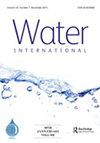So near, yet so far: an Egyptian perspective on the US-facilitated negotiations on the Grand Ethiopian Renaissance Dam
IF 1.5
4区 环境科学与生态学
Q3 ENGINEERING, CIVIL
引用次数: 0
Abstract
Since construction commenced on the Grand Ethiopian Renaissance Dam (GERD) in April 2011, Egypt, Ethiopia and Sudan have been engaged in an extended, and often arduous, process of negotiations on this project. Talks between the co-riparians of the Blue Nile have been conducted in a variety of forums and formats. Countless trilateral and bilateral meetings have been held, including at the level of heads of state and government, ministers of foreign affairs, and ministers of water affairs. The three countries held hundreds of meetings of governmental representatives and nongovernmental academics that deliberated on the engineering, technical and legal aspects of the management of the GERD. International and regional actors, including global powers such as the United States (Widakuswara, 2019) and Russia (Lavrov, 2020), and regional partners such as Algeria (Sudan Tribune, 2021), South Africa (Samir, 2020) and the United Arab Emirates (Reuters, 2021), have either participated in the negotiations or offered their good offices to mediate the dispute. The question of the GERD has also been on the agenda of several international organizations. The United Nations (UN) Security Council convened two sessions and issued a Presidential Statement on the GERD, the African Union (AU) facilitated numerous rounds of talks, and the League of Arab States has expressed concern at the lack of progress in the negotiations. Yet an agreement remains elusive. Here, we focus on the most fruitful chapter of the winding, more than decade-long GERD negotiations, which was the US-facilitated process that lasted from mid-October 2019 to February 2020. We do so not only in the interest of brevity given the difficulty of describing over ten years of negotiations in a single article, but also because examining these US-facilitated negotiations serves three purposes that reveal why the question of the GERD remains unresolved. First, recounting how these negotiations progressed will如此之近,却如此之远:埃及对美国促成的埃塞俄比亚复兴大坝谈判的看法
自2011年4月大埃塞俄比亚复兴大坝(GERD)开工以来,埃及、埃塞俄比亚和苏丹就该项目进行了漫长而艰巨的谈判。青尼罗河沿岸各国之间已通过各种论坛和形式进行了会谈。已经举行了无数的三边和双边会议,包括国家元首和政府首脑、外交部长和水事务部长。三国政府代表和非政府学者举行了数百次会议,讨论了GERD管理的工程、技术和法律方面的问题。国际和地区行动者,包括美国(Widakuswara, 2019年)和俄罗斯(拉夫罗夫,2020年)等全球大国,以及阿尔及利亚(苏丹论坛报,2021年)、南非(萨米尔,2020年)和阿拉伯联合酋长国(路透社,2021年)等地区伙伴,要么参加了谈判,要么为调解争端提供了斡旋。GERD问题也已列入若干国际组织的议程。联合国安理会召开了两次会议并发表了主席声明,非洲联盟促成了多轮谈判,阿拉伯国家联盟对谈判缺乏进展表示关切。然而,协议仍难以达成。在这里,我们关注的是长达十多年的GERD谈判中最富有成效的一章,这是美国推动的进程,从2019年10月中旬持续到2020年2月。我们这样做不仅是为了简洁,因为很难在一篇文章中描述十多年的谈判,而且还因为研究这些美国促成的谈判有三个目的,揭示了为什么GERD的问题仍然没有得到解决。首先,回顾这些谈判是如何进行的
本文章由计算机程序翻译,如有差异,请以英文原文为准。
求助全文
约1分钟内获得全文
求助全文
来源期刊

Water International
工程技术-工程:土木
CiteScore
4.40
自引率
7.70%
发文量
58
审稿时长
6-12 weeks
期刊介绍:
Water International is the official journal of the International Water Resources Association (IWRA), founded in 1972 to serve as an international gateway to the people, ideas and networks that are critical to the sustainable management of water resources around the world. Water International''s articles, state-of-the-art reviews, technical notes and other matter are policy-relevant and aimed at communicating in-depth knowledge to a multidisciplinary and international community. Water International publishes both individual contributions and thematic special issues and sections on cutting edge issues.
All individual manuscript submissions are subject to initial appraisal and peer review by the Deputy Editor in Chief and the Associate Editors, and, if found suitable for further consideration, to peer review by at least one independent, anonymous expert referee. All external peer review is double blind. Thematic issues and sections are handled under comparable procedures by guest editors under the oversight of the Editor in Chief.
 求助内容:
求助内容: 应助结果提醒方式:
应助结果提醒方式:


